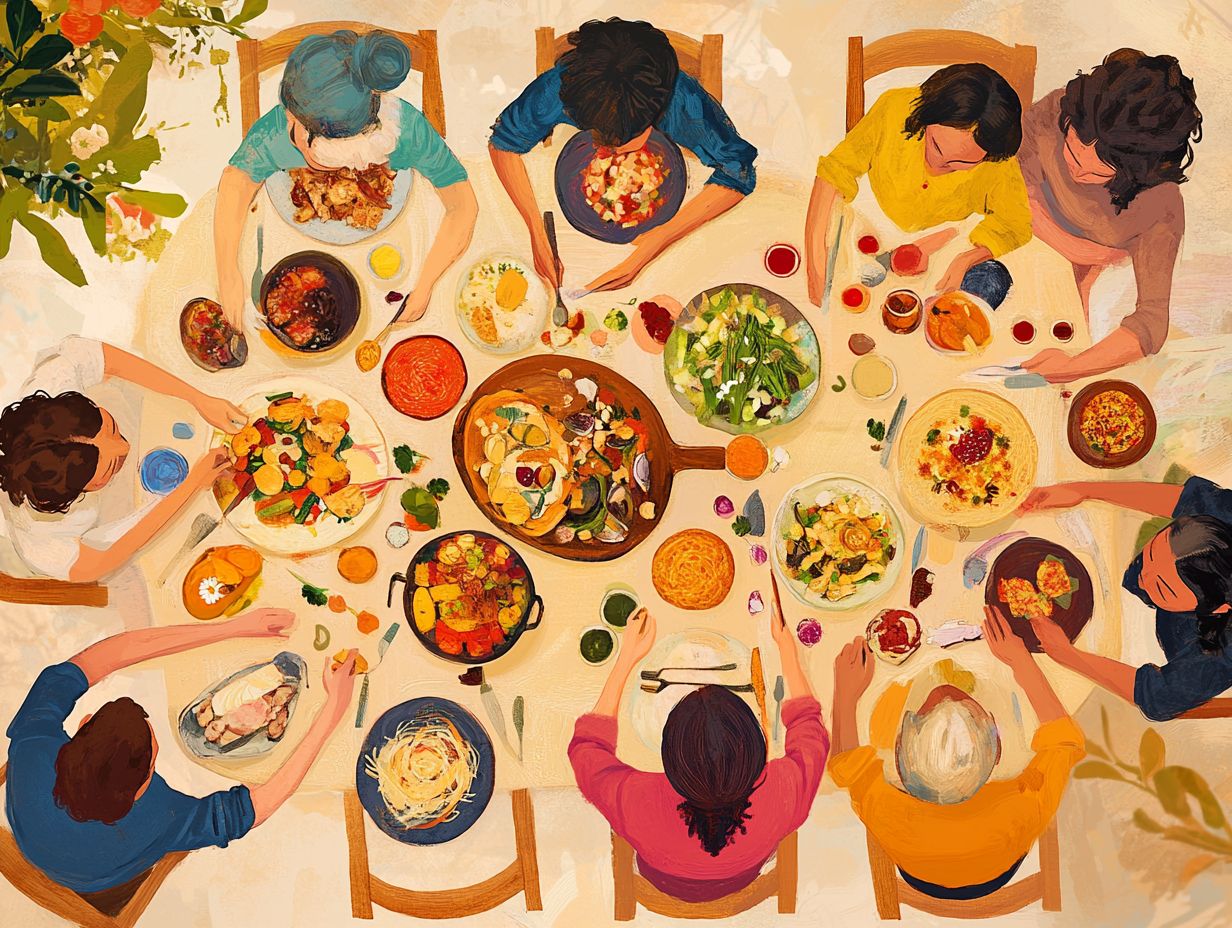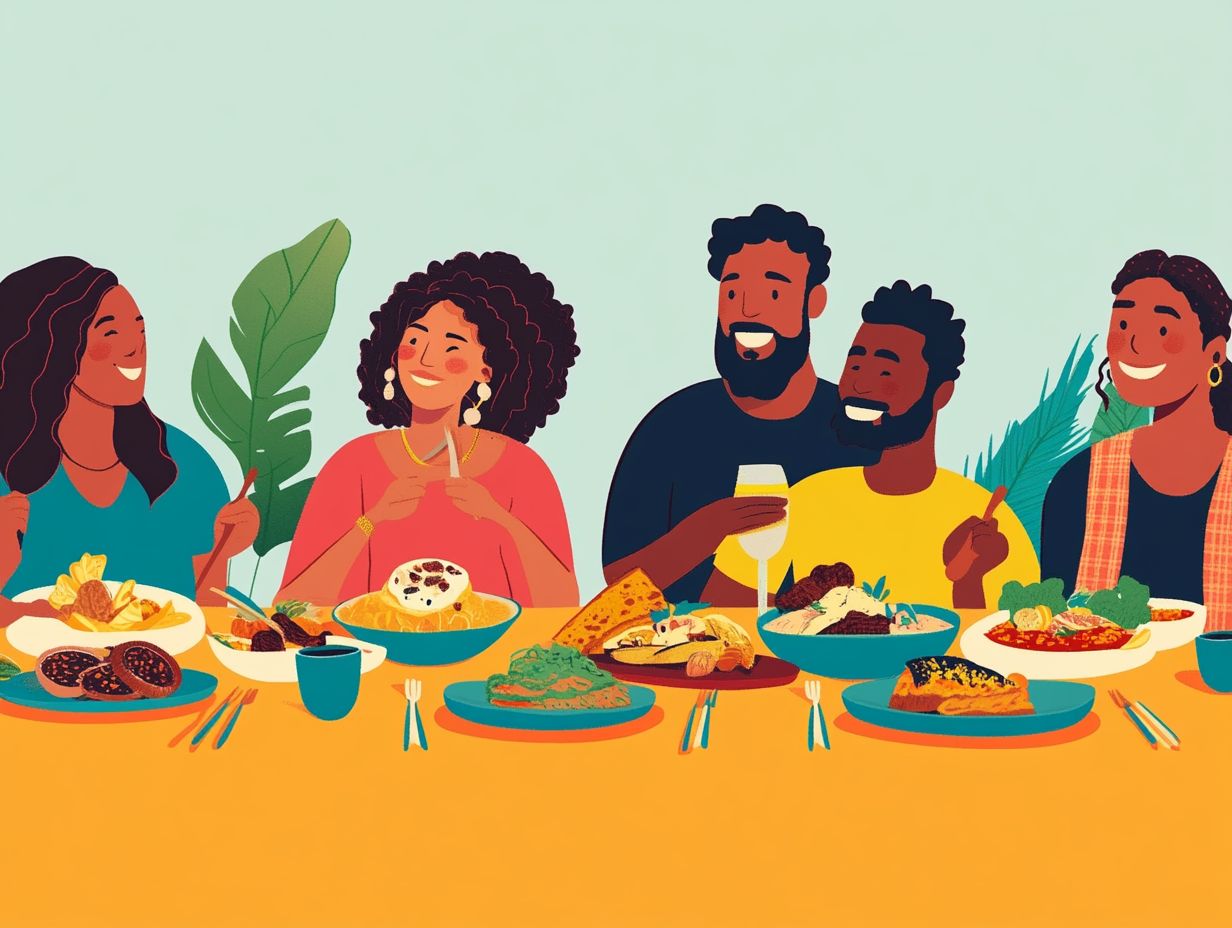How Does Culture Influence Holistic Nutrition?
Holistic nutrition means understanding how your food habits and cultural influences affect your health. It transcends mere dietary choices; it embraces the complex interplay between food, culture, and well-being.
This exploration delves into the fundamental concepts of holistic nutrition, illustrating how cultural influences shape your food preferences. By examining traditional foods and practices, you can discover ways to adapt these to your modern lifestyle while navigating the challenges of culturally sensitive nutrition.
Together, you ll uncover the essential connections between heritage and well-being, paving the way for a healthier, more inclusive approach to your eating habits.
Contents
- Key Takeaways:
- Understanding Holistic Nutrition
- The Role of Culture in Nutrition
- Integrating Cultural Traditions into Holistic Nutrition
- Challenges and Solutions for Culturally Sensitive Nutrition
- Frequently Asked Questions
- What is holistic nutrition and why is culture important in this approach?
- How does culture influence the types of foods that are included in a holistic nutrition diet?
- Can cultural beliefs and practices impact the effectiveness of holistic nutrition?
- In what ways does culture influence the preparation and consumption of food in holistic nutrition?
- What are some potential challenges that individuals may face when trying to adopt a holistic nutrition diet due to cultural influences?
- How can individuals incorporate their cultural background into a holistic nutrition approach?
Key Takeaways:

- Culture plays a significant role in shaping food choices and eating habits, impacting overall health and well-being in a holistic way.
- Integrating traditional foods and practices into holistic nutrition can provide important nutrients, honor cultural traditions, and promote diversity in food choices.
- To promote culturally sensitive nutrition, it is important to address barriers to healthy eating and develop strategies that embrace and celebrate diversity in food cultures and traditions.
Understanding Holistic Nutrition
Understanding holistic nutrition involves appreciating the intricate relationship between your food habits, cultural influences, and personal health. It s not just about what you eat; it’s about how your choices are shaped by cultural beliefs, social dynamics, and environmental factors.
Holistic nutrition invites you to integrate various dietary elements into a cohesive approach that enhances your individual well-being and promotes community health. Embracing this perspective enables you to make informed choices that resonate with your lifestyle and values.
Defining Key Concepts
Grasping key concepts in nutrition is crucial to understanding how your food habits influence your health choices. This involves recognizing a range of factors, including nutrients that give you energy and important vitamins and minerals necessary for optimal functioning.
Nutrition education is pivotal in enabling you to make informed decisions about your diet. It helps you recognize the significance of balanced meals and portion control.
Health programs aimed at promoting public health often weave these concepts into their fabric. They provide community resources and workshops that encourage healthier eating habits. By deepening your understanding of nutritional principles, these initiatives enhance your overall well-being, reducing your risk of chronic diseases and improving your quality of life.
The Role of Culture in Nutrition
Culture plays a crucial role in shaping your dietary habits and food customs. It influences your food choices through deeply rooted cultural beliefs and the social interactions that differ from one community to another.
Cultural Influences on Food Choices

Cultural beliefs play a pivotal role in shaping your food selection and the broader food culture, influencing both individual and community dietary practices.
These influences not only dictate what you consume but also how and when you enjoy meals, highlighting the significance of community and tradition. For example, in many Mediterranean cultures, meals transform into elaborate social gatherings featuring shared dishes that foster conversation and connection. In contrast, certain Asian cultures place great importance on food symbolism, such as consuming dumplings during Lunar New Year, which is believed to usher in prosperity.
Cultural beliefs about health and wellness also guide dietary choices. In Indian culture, vegetarian practices rooted in religious beliefs reflect a profound respect for all living beings and the environment.
What traditions can you bring to your table for better health?
Impact on Health and Well-being
The impact of cultural dietary practices on health and well-being is profound. These practices can either help mitigate the risk of obesity or exacerbate it, along with other chronic diseases related to nutrition.
They shape not only what you consume but also how you perceive food and its significance in your daily life. Traditional foods often reflect the values and beliefs of your community, influencing your choices in ways that directly affect your nutrition and overall health.
Health programs play a vital role in promoting healthier choices and educating communities about the importance of balanced diets. By examining the interplay of dietary and psychological and social influences, you uncover a complex health landscape.
Understanding these cultural nuances allows for tailored interventions that address both your lifestyle habits and mental well-being, ultimately fostering sustainable health improvements.
Integrating Cultural Traditions into Holistic Nutrition
Integrating cultural traditions into holistic nutrition involves a nuanced understanding of how traditional foods and dietary habits harmonize with modern health promotion strategies.
By appreciating these cultural nuances, you can create a more enriching and effective nutritional approach that resonates deeply with diverse lifestyles and values.
Incorporating Traditional Foods and Practices
Dive into the world of whole grains like quinoa and millet! These staples not only provide essential fiber but also a treasure trove of vitamins and minerals.
Legumes such as black beans and lentils, often celebrated in traditional cuisines across the globe, can effortlessly replace meat in your meals. This shift not only supports heart health but also ensures you re getting plenty of protein.
Don t overlook the benefits of fermented foods like kimchi and sauerkraut. These friendly bacteria support your digestive health by being packed with probiotics. By seamlessly weaving these foods into your daily meals like tossing lentils into salads or enjoying fermented vegetables as vibrant sides you can honor your heritage while cultivating a balanced diet that promotes overall wellness.
Adapting to Modern Lifestyles

Adapting traditional dietary habits to modern lifestyles means finding that perfect balance between energy intake and nutritional beliefs. Balancing energy intake and nutritional beliefs can be tricky, especially with the challenges of processed foods and convenience options.
This intricate balancing act calls for innovative strategies to reinterpret age-old recipes that highlight whole, nutrient-dense foods, tailored for your fast-paced life. You may feel overwhelmed by the overwhelming array of processed options that often rob essential vitamins and minerals.
To counter this, consider incorporating simpler cooking methods that honor traditional ingredients but seamlessly fit into your busy schedule.
Meal prepping, for instance, is a brilliant way to ensure that wholesome meals are always at your fingertips. This practice keeps you from relying on less nutritious, quick-fix alternatives. By fostering a deeper understanding of food sourcing and nutrition, you can enable yourself to make informed choices that enhance your lifestyle without compromising your health.
Ready to transform your meals while respecting your roots?
Challenges and Solutions for Culturally Sensitive Nutrition
You may encounter challenges in implementing culturally sensitive nutrition, including barriers to healthy eating and the necessity for effective public health interventions that are tailored to the unique characteristics of different communities.
Addressing these issues is essential for promoting equitable health outcomes and fostering a deeper understanding of diverse nutritional needs.
Addressing Barriers to Healthy Eating
Addressing barriers to healthy eating is essential for enhancing your dietary practices. Cultural factors can significantly influence these challenges.
These barriers may include your socioeconomic status, the availability of fresh produce, and the prevalence of convenience foods that often prioritize taste and affordability over nutritional value. Cultural traditions and family preferences can shape your dietary choices, making it difficult to embrace healthier habits.
To overcome these challenges, communities can implement health promotion strategies that honor cultural foods while also educating you about healthier preparation methods. By merging traditional dietary practices with modern nutritional guidelines, it becomes possible to create a more inclusive approach that encourages better eating habits while allowing you to maintain your cultural identity.
Strategies for Promoting Cultural Diversity in Nutrition
Effective strategies for promoting cultural diversity in nutrition underscore the significance of nutrition education in enabling you to make informed food choices that honor your cultural identity.
By weaving traditional foods and practices into contemporary dietary guidelines, communities can cultivate a richer appreciation for diverse food traditions. Nutrition education programs are essential, employing culturally relevant materials and methods to engage participants meaningfully.
For example, community health initiatives that offer cooking classes in local languages not only impart valuable skills but also celebrate the vibrant tapestry of flavors! Successful collaborations with local chefs and nutritionists to develop culturally specific meal plans showcase best practices that foster inclusivity while promoting healthy eating habits.
Watch this video to learn more about cultural influences in nutrition!
Frequently Asked Questions

What is holistic nutrition and why is culture important in this approach?
Holistic nutrition is a method of nourishing the body that takes into account all aspects of a person’s health, including physical, emotional, mental, and spiritual well-being. Culture plays a crucial role in this approach as it shapes our beliefs, traditions, and practices surrounding food and eating habits.
How does culture influence the types of foods that are included in a holistic nutrition diet?
Culture heavily influences the types of foods that are considered nutritious and beneficial for the body. For example, in Chinese culture, foods like ginger and turmeric are commonly used in cooking and are believed to have healing properties. In Indian culture, vegetarianism is widely practiced for health and religious reasons.
Can cultural beliefs and practices impact the effectiveness of holistic nutrition?
Absolutely! Cultural beliefs and practices can greatly impact the effectiveness of holistic nutrition. For instance, if a person’s culture views certain foods as unhealthy or taboo, they may avoid those foods, even though holistic nutrition considers them nutritious.
In what ways does culture influence the preparation and consumption of food in holistic nutrition?
Culture plays a significant role in the preparation and consumption of food in holistic nutrition. The way food is cooked, served, and eaten can vary greatly across cultures. For example, some cultures believe in eating meals together as a family or community, while others may have specific rituals or traditions surrounding mealtime, which ties into understanding the science behind holistic nutrition.
What are some potential challenges that individuals may face when trying to adopt a holistic nutrition diet due to cultural influences?
Some individuals may face challenges when trying to adopt a holistic nutrition diet due to cultural influences. This may include difficulty finding certain ingredients or foods that are not commonly used in their culture, resistance from family or community members, or conflicting beliefs and practices surrounding food and health.
How can individuals incorporate their cultural background into a holistic nutrition approach?
Individuals can incorporate their cultural background into a holistic nutrition approach by embracing their cultural food traditions and finding ways to make them more nourishing and balanced. This can include incorporating more whole, unprocessed foods, experimenting with new herbs and spices, and exploring what holistic nutrition is and why it matters to create healthier versions of traditional dishes.
Have more questions? Reach out to us!






